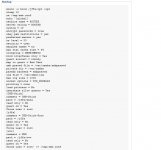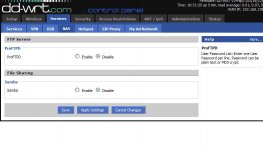server.modules = (
# "mod_rewrite",
# "mod_redirect",
# "mod_alias",
# "mod_access",
# "mod_cml",
# "mod_trigger_b4_dl",
"mod_auth",
# "mod_status",
# "mod_setenv",
# "mod_fastcgi",
"mod_proxy",
# "mod_simple_vhost",
# "mod_evhost",
# "mod_userdir",
# "mod_cgi",
# "mod_compress",
# "mod_ssi",
# "mod_usertrack",
# "mod_expire",
# "mod_secdownload",
# "mod_rrdtool",
# "mod_accesslog"
)
## a static document-root, for virtual-hosting take look at the
## server.virtual-* options
server.document-root = "/jffs/www/"
## where to send error-messages to
server.errorlog = "/jffs/Data/lighttperror.log"
# files to check for if .../ is requested
index-file.names = ( "index.html" )
## set the event-handler (read the performance section in the manual)
# server.event-handler = "freebsd-kqueue" # needed on OS X
server.event-handler = "poll" # needed on OS X
proxy.debug = 0
#### accesslog module
accesslog.filename = "/jffs/Data/lighttpdaccess.log"
######### Options that are good to be but not neccesary to be changed #######
## bind to port (default: 80)
server.port = 80
auth.debug = 0
#auth.backend = "plain"
#auth.backend.plain.userfile = "/jffs/opt/etc/lighttpd/pass.TXT"
auth.backend = "htpasswd"
auth.backend.htpasswd.userfile = "/jffs/opt/etc/lighttpd/lighttpd-htpasswd.user"
$HTTP["host"] =~ "(your.dyns.address.com)" {
$HTTP["url"] =~ "" {
auth.require = ( "" =>
(
"method" => "basic",
"realm" => "Bitte geben Sie Benutzername und Passwort für den geheimen Bereich ein. ",
"require" => "user=sps"
),
)
}
$HTTP["url"] =~ "^/cgi-bin(.*)$" {
proxy.server = ("" => (
("host" => "192.168.0.20", "port" => 80)
))
}
}
$HTTP["host"] =~ "192.168.0.1" {
$HTTP["url"] =~ "^/cgi-bin(.*)$" {
proxy.server = ("" => (
("host" => "192.168.0.20", "port" => 80)
))
}
}
$HTTP["host"] =~ "(router)" {
$HTTP["url"] =~ "^/cgi-bin(.*)$" {
proxy.server = ("" => (
("host" => "192.168.0.20", "port" => 80)
))
}
}











